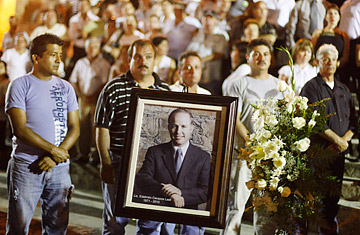
Residents stand behind a picture of Edelmiro Cavazos, the mayor of Santiago, Mexico, who was abducted and slain by a drug cartel
The murder scarred a part of Mexico that was supposed to be reasonably safe from violence and crime. Santiago is a picturesque town of waterfalls, colonial churches and holiday homes for the rich. Its mayor, Edelmiro Cavazos, was a blue-eyed 38-year-old educated in the U.S. But it seems that no corner of the country is shielded from the relentless rain of drug-related bloodshed.
The killers came for Mayor Cavazos in the early hours of Aug. 16, when seven SUVs rolled up and men in police uniforms descended on his palatial home. Servants stood back terrified as their boss was forced away at gunpoint. On Aug. 18, his corpse was dumped on a nearby road. There was a mercy of sorts in the manner of his killing — shot dead with two bullets in the head and one in the chest, and spared the mutilation and rape inflicted on so many other victims. The following day, hundreds of residents wept over his coffin in Santiago's central plaza, lining the stairs up to the church with candles and holding signs calling for peace.
Then, on Aug. 20, more disturbing news broke. State agents arrested six of the mayor's own police officers and said they confessed to involvement in the murder. The suspects had been working for a drug cartel that is fighting a bloody turf war with its rival throughout northeast Mexico, state prosecutors said. Another four alleged gunmen were arrested with automatic rifles and grenade launchers in their possession and accused of being involved in the plot. The revelation had very concerning implications: in Mexico's drug war, officials are now killing officials.
Cavazos — a member of President Felipe Calderón's conservative National Action Party — was the latest in a series of politicians who have been killed or kidnapped this year. In June, a commando group of gunmen assassinated the top gubernatorial candidate in the neighboring state of Tamaulipas. In May, a former presidential candidate was kidnapped from his ranch in Central Mexico and is still missing. A mayoral candidate and state legislator have also been murdered. Following the latest slaying, President Calderón said that Mexico's very democracy is under threat. "The death of Edelmiro makes us angry and obliges us to double our efforts in the struggle against these criminal cowards that attack citizens," he said.
But despite calls for national unity to face this challenge, Mexico's politicians keep slinging mud and trading mutual recriminations over who is to blame. Opposition deputies say that Calderón's policy of sending the entire army after cartels has been catastrophic, inflaming turf wars and shoot-outs. Since Calderón took office in December 2006, there have been an incredible 28,000 drug-related killings, it was recently revealed. Calderón has answered back, challenging the opposition to come up with a better idea.
When the President called for dialog with Congress this week to work out a national-security plan, key leaders in two major parties snubbed him and said they had other engagements. An irritated Calderón then said that soldiers would stay on the streets until his last day in office in 2012. Politicians could not even manage to unify over the latest tragedy. As National Action Party militants prepared posters lamenting the death of Mayor Cavazos, the opposition accused them of political opportunism.
With Mexico's justice system failing to clear up the facts surrounding the vast majority of killings, it is unclear exactly why politicians are being targeted. Federal agents say that gangsters are desperate after so many drug busts and arrests and are lashing out at the system in the hope that the army will be sent back to the barracks. However, the government has also conceded there are cases of corruption, with elected officials themselves in cahoots with drug gangs. In May, police arrested former Cancún mayor and gubernatorial candidate Gregorio Sanchez on racketeering and drug-smuggling charges. On Aug. 19, gunmen attacked the judge in charge of Sanchez's case, killing his bodyguard. Calderón responded that Mexico should consider judges with protected identities to handle drug-related cases. Officials have also come under fire for attacking corrupt officers. Following an attack on the public-safety secretary of Michoacán this year, an arrested cartel member said the official had been targeted for trying to shake up the state police force, threatening officers on the cartel's payroll.
There are fears that that many more officials could be in danger. Senator Ramón Galindo, the former mayor of murder capital Ciudad Juárez, said he knew of dozens of mayors who had received threats. "It is clear that organized-crime groups are not only threatening but are also doing great harm to local politicians," Galindo said. Back in Santiago, the fallen mayor's mother Rubinia Leal de Cavazos told reporters that her son had feared attacks. "I told him to watch out for traitors and to leave his job," she said, shielding her tearful eyes with sunglasses. "He never said he was scared. I hugged him and told him I loved him."
